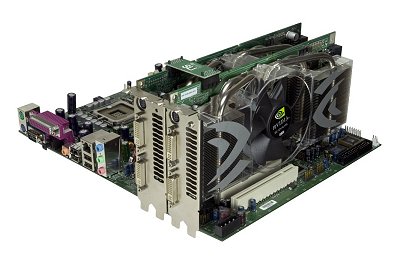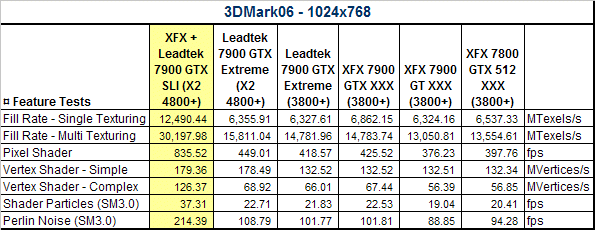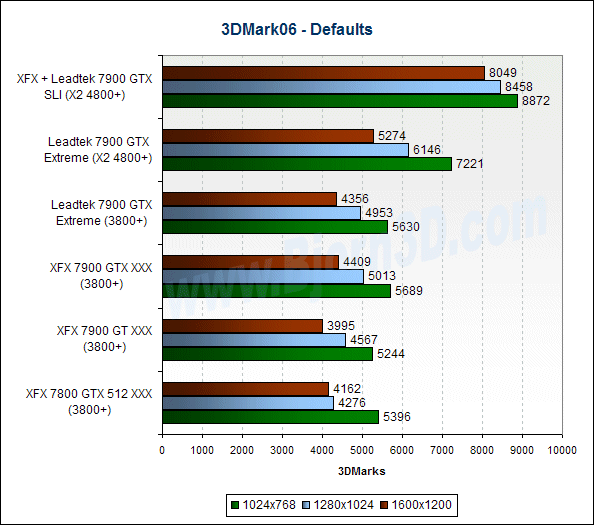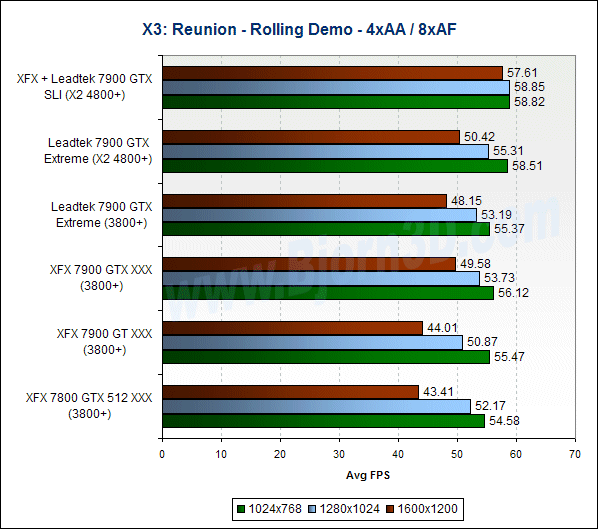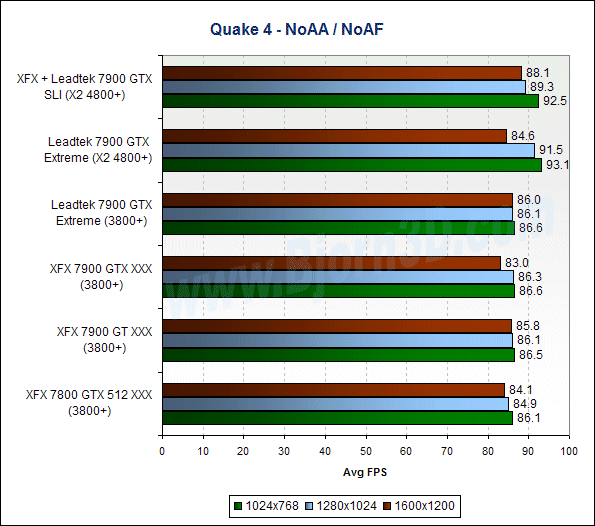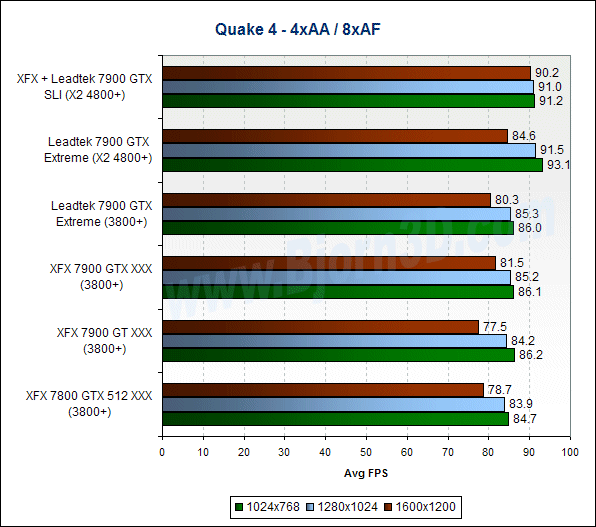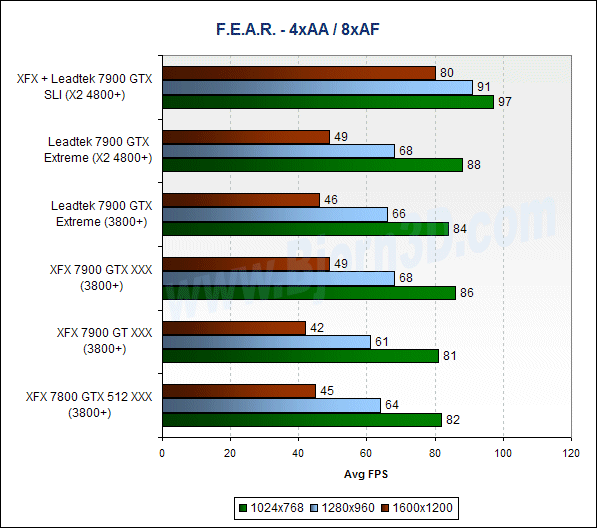Ever wonder if you really can mix NVIDIA GeForce video cards from different manufacturers in SLI? In this article, we show you that you can and show the performance of a Leadtek 7900 GTX combined with an XFX 7900 GTX.
Introduction
In November of last year, NVIDIA’s ForceWare Release 80 brought mixed vendor support to SLI. This support allows users to run an SLI system with two of the same GPUs from different manufacturers. In other words, with ForceWare 81.94 and later, you can use a GeForce 6800 GT from manufacturer A with a GeForce 6800 GT from manufacturer B in your SLI system. Or, you could pair a Leadtek 7900 GTX Extreme with an XFX 7900 GTX XXX, which is just what we happen to be testing today.
Remember the following points when mixing vendors for SLI:
- GPUs must match (ex: 7900 GT with a 7900 GT and not with a 7800 GT or 7900 GTX)
- I/O ports don’t have to match (ex: VIVO cards can be mixed with non-VIVO cards)
- Clock speeds don’t have to match
- Memory sizes don’t have to match (although it is recommended)
Some of you might wonder why anyone would ever want to mix vendors when setting up an SLI rig. Well, the truth is there are a lot of gamers out there who save up to buy one card to install on their SLI motherboard and then stumble upon a good deal for another one from a different manufacturer later. Rather than having to sell one of the cards to buy a new one from the other manufacturer, they can just use them together. Less hassle, more gaming.
We actually have received questions recently about mixed vendor support, so we hope this article will be helpful to some of you. Although NVIDIA has supported it for over five months, many users either aren’t aware of mixed vendor support, or they just don’t understand it.
The main purpose of this article initially was to show 7900 GTX SLI performance, but since we didn’t have a matching pair of 7900 GTXs, we had to utilize a mixed pair. This allows us to also cover mixed vendor support at the same time. So, follow along as we take a brief look at mixed vendor 7900 GTX SLI performance.
Test Systems & Benchmarks
We tried to use the same test system that was used in our 7900 GTX reviews, but that system had a problem (specs for this system are listed under Test System 1 below). We didn’t determine the exact cause, but our guess is that it was either a heat or power issue. Either the 680W Thermaltake PSU couldn’t handle the load, or the fact that the DFI LP NF4 SLI-DR PCI Express slot layout causes the two cards to nearly be touching led to a heat build up issue.
This made it a good time to try out a newly built system with a more powerful CPU, more spread out PCI Express x16 slots and an SLI certified PSU (Test System 2 below). Thankfully, the new system runs the dual 7900 GTX setup just fine. We haven’t had any problems with it yet. Take a look at the two test systems below.
Test System 1
- DFI LANParty NF4 SLI-DR Motherboard (review)
- AMD Athlon 64 3800+ (2.4GHz)
- Corsair TWINX1024-3200XL (review)
- Maxtor 120GB Serial ATA 7200RPM Hard Drive
- Video Card 1: Leadtek WinFast 7900 GTX TDH Extreme – ForceWare 84.17
- Video Card 2: XFX GeForce 7900 GTX XXX Edition – ForceWare 84.17
- Video Card 3: XFX GeForce 7900 GT XXX Edition – ForceWare 84.17
- Video Card 4: XFX GeForce 7800 GTX 512 XXX Edition (review) – ForceWare 84.17
- Thermaltake 680W PurePower PSU
- Windows XP with Service Pack 2 and DirectX 9.0c
- Dell 20.1″ LCD, max resolution 1600×1200
Test System 2
- ASUS A8N32-SLI Deluxe
- AMD Athlon 64 X2 4800+ (2.4GHz dual-core)
- Corsair TWINX1024-3200XL (review)
- Maxtor 120GB Serial ATA 7200RPM Hard Drive
- Video Card 1: Leadtek WinFast 7900 GTX TDH Extreme – ForceWare 84.17
- Video Card 2: SLI – Leadtek WinFast 7900 GTX TDH Extreme + XFX GeForce 7900 GTX XXX Edition – ForceWare 84.17
- SilverStone 600W ST60F PSU
- Windows XP with Service Pack 2 and DirectX 9.0c
- Dell 20.1″ LCD, max resolution 1600×1200
You might be wondering what speed the SLI combination runs at since both cards are overclocked. This particular combo runs at 675MHz core and 1.66GHz memory, which is the speed of the Leadtek 7900 GTX Extreme.
Benchmarks
- 3DMark06 – default settings
- Quake 4 v1.1 – NoAA / NoAF and 4xAA / 8xAF
- F.E.A.R. v1.03 – 4xAA / 8xAF
- X3: Reunion, Rolling Demo – 4xAA / 8xAF
In the benchmark results, you’ll of course see the benefits of going from a single 7900 GTX to two in SLI. Additionally, you’ll get an idea of the performance gain from going from a 3800+ to an X2 4800+.
3DMark06 & X3: Reunion
The feature tests in 3DMark06 reveal a significant performance improvement from going to SLI. The overall scores reveal similar performance gains. Unless you really care about 3DMark bragging rights though, these results don’t tell us anything about how actual games will benefit from running SLI in a system similar to our test system.
X3 seems to really test a system, and it looks like we need an even faster CPU to really show what SLI can offer in this game. This is a good reminder that when it comes to SLI and various system configurations, make sure you keep your expectations realistic.
Quake 4 & F.E.A.R.
For a consistent comparison, we ran all the Quake 4 tests at High Quality. As you can see, the only gain from going to SLI is at 1600×1200 with 4x AA and 8x AF. The results seem rather odd; we expected SLI to show off a little more. We even cranked up the eye candy to Ultra Quality and 4x AA / 16x AF, but the SLI configuration only outperformed the single 7900 GTX by about 7 frames per second.
F.E.A.R. was the benchmark we were most looking forward to seeing how much SLI could help performance since it is a very power-hungry game. These results are definitely impressive and could definitely help convince someone to spend twice the money for SLI gaming. Playing F.E.A.R. at 1600×1200 with 4x AA and 8x AF was a treat. Frame rates stayed smooth and the game looked awesome.
Final Thoughts
While our test system and the chosen benchmarks didn’t help present the most impressive picture of 7900 GTX SLI, we were at least able to show that mixed vendor SLI works fine. So, hopefully now, some of you won’t have reservations about mixing cards from the different manufacturers in an SLI system. Just remember that the GPUs must match, and you have to use ForceWare 81.94 or later.
 Bjorn3D.com Bjorn3d.com – Satisfying Your Daily Tech Cravings Since 1996
Bjorn3D.com Bjorn3d.com – Satisfying Your Daily Tech Cravings Since 1996
